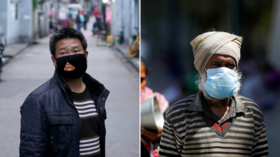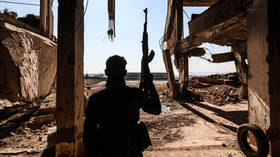Preparing for a post-Covid world? China and India settle old scores and team up

With the Covid-19 pandemic set to drastically reshape the world order, there are signs that China could see India as the best future ally. Can both countries use this dark time to smooth out their sometimes rocky relationship?
When India and China marked the 70th anniversary of formal diplomatic ties this month, the usual political formalities were exchanged. Chinese President Xi Jinping congratulated Indian President Ram Nath Kovind on the “extraordinary development” both nations had undertaken since India became the first non-socialist country to recognise Chairman Mao’s China in 1950.
Also on rt.com Why East beats West in the war against coronavirusAnger in the west
The warmth and bonhomie — coming just weeks after US President Donald Trump openly criticized China during his highly successful visit to India — may seem unusual. But a look behind the diplomatic pleasantries suggests that Xi’s mention of “a new starting point” could imply a post-Covid plan for the famously far-sighted government in Beijing.
The coronavirus has infected over 1.4 million people worldwide, and killed more than 82,000. China has been seen by many states as culpable, based on Beijing’s initial downplaying of the threat, and its alleged failure to respect the 2005 International Health Regulations and notify the world of the outbreak. Already, lawyers and activists have sued China in US courts, with one conservative lawyer in Texas demanding $20 trillion in compensation.
Even though the Texas lawsuit will likely succeed in only grabbing headlines, a post-Covid world order could see China isolated by the West. For example, rumblings from within London’s Downing Street suggest that Boris Johnson’s government will treat China as a “pariah state” when the pandemic subsides.
Also on rt.com ‘What do you have to lose?’ Trump touts anti-malaria drug as Covid-19 cure, urges India to lift export banTo top it all off, public statements by President Trump calling Covid-19 a “Chinese Virus” have angered Beijing. Chinese diplomats have since led a worldwide campaign to convince various governments not to use the phrase “China virus.”
New Delhi has adopted a more balanced approach to the challenge of the pandemic and has sought to collaborate with China. In a phone call last month, Chinese foreign minister Wang Yi told New Delhi that “China is ready to share our experience, provide assistance within our capacity and open its channel for procurement to India.” Indeed, India was the among the first to receive critical medical supplies from China including protective gears, masks and ventilators.
Rocky relations
These developments stand in strong contrast to the history of disagreement between both countries. China lays claim to a Switzerland-sized chunk of territory within Kashmir, which is in turn claimed by India. A border dispute in the Himalayas erupted into open war in 1962, and skirmishes have broken out along the frontier in the decades since.
As recently as 2017, the armed forces of India and China faced off against each other for 75 days, during the Doklam crisis.
However, relations since then have gradually stabilized, with two successful informal summits held between Xi and Indian Prime Minister Narendra Modi in Wuhan and Mamallapuram in 2018 and 2019, where the two sides chose to skip contentious issues and instead focussed on enhancing bilateral trade and boosting economic cooperation.
But, China’s hostility to India in international fora continued. For instance, New Delhi’s efforts to get China's backing for Nuclear Suppliers Group (NSG) membership, and getting Pakistani jihadist Masood Azhar designated as a terrorist by the UN failed to gain traction with Beijing. Also, China called New Delhi's decision to withdraw Kashmiri autonomy last year "unacceptable," and openly supported Pakistan in the dispute.
Post-Covid World Order
Now though, things could be changing. Just last week, in a sharp departure from its earlier position, China — as president of the UN Security Council — ignored a plea from Pakistan for “urgent consideration” of what it called “grave developments in Jammu and Kashmir” by the government of India. To the astute observer, China’s inaction spoke volumes, and signaled that previous disagreements won’t get in the way of mending bilateral ties.
Also on rt.com Covid-19 dismantles the hollow commandments of European liberalismOf course, Beijing is looking to the future from a place of self-interest. Industrial output in the country has shrunk by 21 percent and economists predict China’s growth rate will be halved this quarter. Growth in the world’s second-largest economy has already been slowing for more than a year, but the hammer blow dealt to it by Covid-19 could leave Beijing looking for allies moving forward.
The current pandemic is bound to have a major impact, and the post-Covid world will wake up to a landscape of divided allies and an economically weakened EU and United States. In fact, all major economies except India and China are forecast to enter deep recession.
For China, which is currently facing hostility from the West, resetting its relations with India could be the most favourable option in a post-Covid world order.
Think your friends would be interested? Share this story!
The statements, views and opinions expressed in this column are solely those of the author and do not necessarily represent those of RT.














